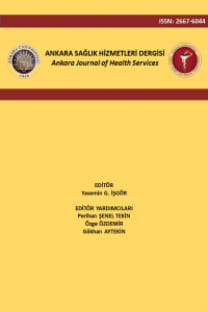GERİATRİK AMPUTELERDE DEMOGRAFİK ÖZELLİKLERİN İNCELENMESİ: RETROSPEKTİF BİR ÇALIŞMA
Çalışmamız geriatrik amputelerin demografik özelliklerini incelemek amacıyla yapıldı. Çalışmaya 1974-2005 yılları arasında H.Ü. Sağlık Bilimleri Fakültesi Fizik Tedavi ve Rehabilitasyon Bölümü Protez-Biomekanik Ünitesi’nde protezleri yapılan toplam 852 geriatrik ampute alındı. Retrospektif olarak incelenen amputeler yaş, cinsiyet, meslek, medeni durum, amputasyon nedeni, amputasyon seviyesi ve tarafı, amputasyona katılan ekstremite sayısı, protez eğitim süresi ve amputasyona eşlik eden problemler açısından incelendi. Yapılan değerlendirmeler sonucunda yaşları 65 ile 85 yıl arasında değişen amputelerin 707 (%82.98) inin erkek olduğu, en fazla görülen amputasyon nedeninin periferik vasküler hastalıklar olduğu (%50.46), ancak bunu travmaların izlediği (%41.31) tespit edildi. Amputasyon seviyesi açısından bakıldığında birinci sırayı alt ekstremitede diz üstünün, üst ekstremitede ise dirsek üstünün aldığı tespit edildi. Geriatrik amputelerde protez eğitim süresinin 3 hafta ile 10 hafta arasında değiştiği, bu sürenin özellikle amputasyon nedeni dolaşım bozukluğu olanlarda uzadığı gözlendi. Geriatrik amputelerde amputasyon nedeni, amputasyon seviyesi, protez eğitim süresi ve amputasyona eşlik eden problemlerin geriatrik ampute rehabilitasyonu açısından göz önünde bulundurulması gereken faktörler olduğu sonucuna varıldı
Anahtar Kelimeler:
Geriatrik ampute, ampute, rehabilitasyon, protez eğitimi
INVESTIGATING DEMOGRAPHIC CHARACTERISTICS IN GERIATRIC AMPUTEES
The aim of this study was to investigate demographic characteristics in geriatric amputees. The study included total 852 geriatric amputees. Age, gender, profesion, mariatal status, cause of amputation, amputation level and side, amputated extremity number, prosthetic training period and other problems were investigated in the amputees who assessed as retrospective. It was determined that 707 (82.98 %) amputees, aged between 65 and 85 years were male. The cause of amputation was mostly periferic vascular diseases (50.46%) and secondly trauma (41.31%). It was determined that there were mostly transfemoral amputation in lower limb and secondly transhumeral amputation in upper limb. The prosthetic training period were between 3-10 weeks in geriatric amputees. This period was more long in amputees with circulation disorders. It can be concluded that the evaluating cause of amputation, amputation level, prosthetic training period and others problems are important in geriatric amputee rehabilitation
Keywords:
Geriatric amputee, amputee, rehabilitation, prosthetic training,
___
- Frieden RA. The geratric amputee. Phys Med Rehabil Clin N Am. 2005; 16(1):179-195.
- Andrews KL. Rehabiliation in Limb Deficiency. 3. The Geratric amputee. 1996; 77: 14-17.
- Esquenazi A. Geratric amputee rehabiliation. Clin Geriatr Med. 1993; 9(4): 731-743.
- Şener G, Yiğiter K, Ülger Ö, ve ark. Geriatrik amputelerde demografik değerlendirme. Uluslararası Katılımlı V. Ulusal Protez-Ortez Kongresi Kitabı. Lazer Ofset, 2005; 267-273.
- Fletcher DD, Andrews KL, Butters MA, et al. Rehabiliation of the geriatric vascular amputee Patient: a population-based study. Arch Phys Med Rehabil. 2001; 82: 776-779.
- Kavounoudias A, Tremblay C, Gravel D, et al. Bilateral Changes in somatosensory sensibility after unilateral trans-tibial amputation. Arch Phys Med Rehabil 2005;86:633-640.
- Brunelli S, Averna T, Porcacchia P, et al.Functional status and factors influencing the rehabilitation outcome of people affected by trans-femoral amputation and hemiparesis. Arch Phys Med Rehabil 2006;87:995- 1000.
- Steinberg FU, Sunwoo I, Roettger RF. Prosthetic rehabilitation of geriatric amputee patients: a follw-up study. Arch Phys Med Rehabil. 1985; 66: 742-745.
- McAnelly R, Refaeian M, O"Connell D, et al. Successful prosthetic fitting of a 73- year-old hip disarticulation amputee patient with cardiopulmonary disease. Arch Phys Med Rehabil. 1998; 79(5): 585- 588.
- Lemaire ED, Fisher FR. Osteoarthritis and elderly amputee gait. Arch Phys Med Rehabil. 1994; 75(10): 1094-1099.
- Adunsky A, Wershawski M, Heruti R, et al. Non-traumatic lower limb older amputees: a database survey from a bgeriatric centre. Disabil Rehabili. 2001; 23(2): 80-84.
- Hutton IM, Rothnie NG. The early mobilization of the elderly amutee. Br J Surg. 1997; 64(4): 267-270.
- Abadee P, Kern P, Hong C. Rehabilitation in dual disability of hemiplegia and upper extremity amputation: two case reports. Arch Phys Med Rehabil. 1986; 68: 226-228.
- Altner PC, Rusin JJ, De Boer A. Rehabilitation of blind patients with lower extremity amputations. Arch Phys Med Rehabil. 1980; 61: 82-84.
- Sioson ER. The elderly amputee with severe chronic obstructive pulmonary disease. Case reports. J Am Geriatr Soc. 1990; 38(1): 51-52.
- Yiğiter K, Bayar K, Erbahçeci F, ve ark. Hemiplejik diz altı amputede nörofizyolojik yaklaşımlı egzersizlerin ambulasyona etkisi-olgu sunumu-. Türk Beyin Damar Hastalıkları Dergisi. 2002; 8(1): 19-21.
- Thyberg M, Johansen B. Prosthetic rehabilitation in unilateral high above-elbow amputation and barachial plexus lesion:case report. Arch Phys Med Rehabil. 1986; 67:260-261.
- Yayın Aralığı: Yılda 2 Sayı
- Başlangıç: 2000
- Yayıncı: Ankara Üniversitesi
Sayıdaki Diğer Makaleler
Hakkindaki BİLGİ, FADİME ÜSTÜNER, AKGÜL UYSAL, Bariş KAYA
ERKEN PROTEZ UYGULAMALARININ ETKİLERİNİN ARAŞTIRILMASI
Kezban BAYRAMLAR, İmmediate Prosthetic FITTING
Hakkindaki BİLGİ, FADİME ÜSTÜNER, AKGÜL UYSAL, Bariş KAYA
GERİATRİK AMPUTELERDE DEMOGRAFİK ÖZELLİKLERİN İNCELENMESİ: RETROSPEKTİF BİR ÇALIŞMA
Mehmet ALTINÖZ, Hasan TUTAR, THE SERVICE SECTOR
BİR GRUP ERGENİN AİLE İŞLEVLERİNİN DEĞERLENDİRİLMESİ
Kezban BAYRAMLAR, Hicran KUMBAS, Olcay ÇAM, Gülseren KESKİN, Questionnaire Form
